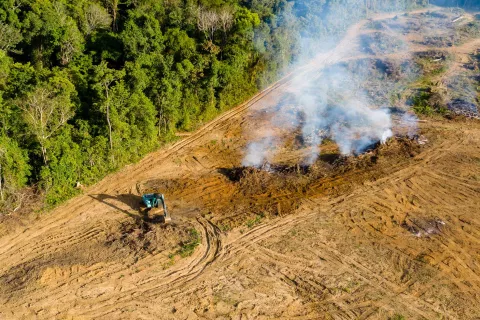
The expansion of agricultural land for the production of animal feed or palm oil is the biggest driver of loss and degradation of forests and other natural ecosystems worldwide. The EU’s demand for these so-called forest and ecosystem risk commodities plays a significant part in global deforestation linked to international trade.
The EU Commission’s legislative proposal for a Regulation on deforestation-free products from November 2021 already fell short by protecting only forests from deforestation and degradation for the EU’s consumption of forestry and agricultural products. Originally, the EU Parliament recommended to the EU Commission to provide an EU legal framework that assures the protection of natural resources, such as natural forests, biodiversity and natural ecosystems, and to avoid their degradation and conversion. Forests, but also other important ecosystems, such as savannahs, mangroves and peatlands, fall victim to the expansion of agricultural land for Europe’s agricultural products. To stop the destruction of ecosystems and associated human rights violations, the global extinction of species and climate change, we demanded the German government to push for an EU regulation that protects not only forests but also other natural ecosystems with high ecological and social value and essential carbon storage functions.
Ministers vote against the protection of non-forest ecosystems by the Regulation
On June 28, the Environmental Ministers of the EU Member States presented their position on the Commission’s proposal to tackle EU-driven global deforestation at the Environmental Council’s meeting. Among many other serious loopholes, the proposal of the EU Council foresees an evaluation of the need and the feasibility of extending the scope of this Regulation to other ecosystems only within two years of its entry into force.
Another serious gap in the Council’s position on the proposal is that it only requires that companies producing for the EU market comply with the laws of the producing country. This implies a huge risk for products entering the EU market that have been produced violating the rights of Indigenous peoples and the protection of their territories – for example in Brazil: With the dismantling of environmental and Indigenous rights protection policies and institutions by the current Brazilian government and the increase in violence against Indigenous people and traditional communities in Brazil, it is not guaranteed that agricultural products imported from Brazil have been produced according to international human rights.
As importers of commodities that accelerate the degradation, invasion and destruction of forests and other ecosystems with high environmental and social value, the EU member states need to take responsibility for the impacts that their demand for products has. A cross-country YouGov survey shows that nearly 9 out of 10 Europeans support strengthening the draft law to protect the rights of Indigenous peoples.
The members of the EU Parliament must agree on their position on the Commission’s proposal by July 11-12. Germanwatch calls now on members of the Parliament to push for a clear and comprehensive re-sharpening of the regulation to protect forests, people and the climate. We need a legislation that restricts the import to commodities and products that have been produced complying with international laws on human rights such as the 'Convention No. 169 on Indigenous and Tribal Peoples' of the International Labour Organization. Although producer countries like Brazil might have signed-up to international human rights conventions, this provides no guarantee that national laws provide protection for the human rights of Indigenous peoples.
Background info and next steps:
If an EU regulation on deforestation free products comes into force, affected companies will be restricted to only placing forest risk commodities on the EU market or exporting them from the EU if they met certain sustainability criteria. Affected operators would in advance have to assess and mitigate the risk of forests being cleared for the production of their goods and to make a due diligence declaration. The EU Parliament must compromise amendments in the coming days before the Committee on the Environment, Public Health and Food Safety (ENVI Committee) votes on them on July 11-12.

